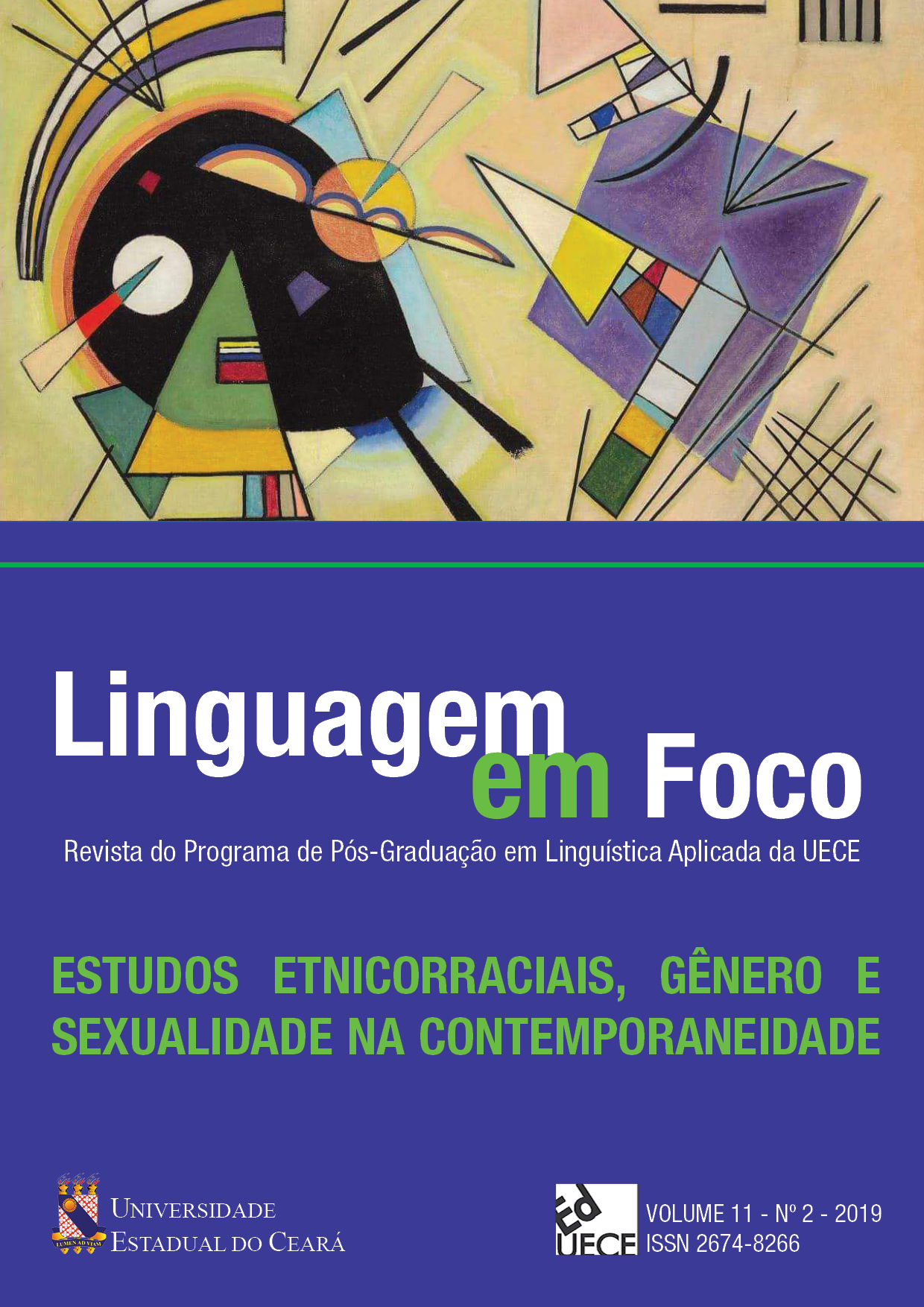Discourse in Phraseological Units
The Expression “Lugar de Mulher É Onde Ela Quiser”
DOI:
https://doi.org/10.46230/2674-8266-11-2922Keywords:
Discourse analysis, Phraseological units, preconstructedAbstract
This paper aims at analysing and proposing a discussion about the expression “Lugar de mulher é onde ela quiser” (A woman’s place is wherever she wants) from a pecheutian perspective of discourse analysis and the support of the concept of phraseological units, highlighting how it works in a discoursive level. To reach this aim, the utterance will be observed as a phraseological unit, whose main features both strutuctural as well as related to its meaning will be discussed, in order to bring it closer to the concepts of preconstructed and sustaining effect, suggested by Pêcheux, which are discoursive mechanisms that act on the moment of the utterance’s production and reception. The discussion demonstrates how this utterance was possible based on a previous and antagonistic: “Lugar de mulher é na cozinha” (Women belong in the kitchen), which reverberates other phraseological units in Portuguese. In the last section, the results of the analysis about approximations between the phraseological units and the discoursive field will be done.
Downloads
References
AGAMBEN, G. Homo Sacer: o poder soberano e a vida nua i. Belo Horizonte: Editora UFMG, 2004.
AUSTIN, J. L. How to do things with words. Cambridge: Harvard University Press,
1990.
BUTLER, J. Excitable Speech: a Politics of the Performative. Nova York: Routledge, 1997.
D'ADESKY, J. Percursos para o reconhecimento, igualdade e respeito. Rio de Janeiro: Cassará Editora, 2018.
FANON, F. Pele negra, máscaras brancas. Salvador: EDUFBA, 2008.
______. Los condenados de la tierra. Buenos Aires: Fondo de Cultura Económica, 2015.
FOUCAULT, M. Direito de morte e poder sobre a vida. In: ______. História da sexualidade I: a vontade de saber. Rio de Janeiro: Edições Graal, 1988.
______. Segurança, território e população: curso dado no collège de France (1977 – 1978). São Paulo: Martins Fontes, 2008.
HILÁRIO, L C. Da biopolítica à necropolítica: variações foucaultianas na periferia do capitalismo. Sapere Aude-Revista de Filosofia, v. 7, n. 13, p. 194-210, 2016.
MBEMBE, A. Necropolítica: sobre el gobierno privado indirecto. Santa Cruz de Tenerife: Editorial Melusina, 2011.
______. Crítica da razão negra. Lisboa: Antígona, 2014.
MELO, G. C. V. O lugar da raça na sala de aula de inglês. Revista da ABPN, v. 7, n. 17, p. 65-81, jul./out., 2015.
MOURA, C. O negro, de bom escravo a mau cidadão? Rio de Janeiro: Conquista, 1977.
NASCIMENTO, A. do. O genocídio do negro brasileiro: processo de um Racismo Mascarado. Rio de Janeiro: Paz e Terra, 1978.
OLIVEIRA, D. A de. Gestão Racista e Necropolítica do espaço urbano: apontamento teórico e político sobre genocídio da juventude negra na cidade do Rio de Janeiro. Texto apresentado no NEGRA (Núcleo de Estudo e Pesquisa em Geografia Regional da África e da Diáspora): Faculdade de Formação de Professores da UERJ, 2014.
RAJAGOPALAN, K. Designação: a arma secreta, porém incrivelmente poderosa da mídia, em conflitos internacionais. Estudos Linguísticos (Anais do GEL), v. 27, CDRom, 2003.
______. Pós-modernidade e a política de identidade. In: RAJAGOPALAN, K. ; MARTINS FERREIRA, D. M. (Orgs.). Políticas em linguagem: perspectivas identitárias. São Paulo: Mackenzie, 2006. p. 61-80.
SILVA, D. N. Pragmática da Violência: o Nordeste na mídia brasileira. 2010. 192f. Tese (Doutorado) – Universidade de Campinas, Campinas, São Paulo, 2010.
______. Language and violence. Pragmatic perspectives. Amsterdam; Philadelphia: John Benjamins Publishing companies, 2017.
SILVERSTEIN, M. Metapragmatic discourse and metapragmatic function. In: Lucy. J. A. (Ed.). Reflexive language: reported speech and metapragmatics. Cambridge: Cambridge University Press, 1993.
ZACCONE, O. Indignos de vida: a forma jurídica da política de extermínio de inimigos na cidade do Rio de Janeiro. Rio de Janeiro: Revan, 2015.
Downloads
Published
How to Cite
Issue
Section
License
Copyright (c) 2020 Michell Gadelha Moutinho

This work is licensed under a Creative Commons Attribution 4.0 International License.
Authors who publish in Linguagem em Foco Scientific Journal agree to the following terms:
- Authors retain the copyright and grant the journal the right of first publication. The articles are simultaneously licensed under the Creative Commons Attribution License which allows sharing the work with an acknowledgement of its authorship and initial publication in this journal.
- The concepts issued in signed articles are the absolute and exclusive responsibility of their authors. Therefore, we request a Statement of Copyright, which must be submitted with the manuscript as a Supplementary Document.
- Authors are authorized to make the version of the text published in Linguagem em Foco Scientific Journal available in institutional repositories or other academic work distribution platforms (ex. ResearchGate, Academia.edu).





























